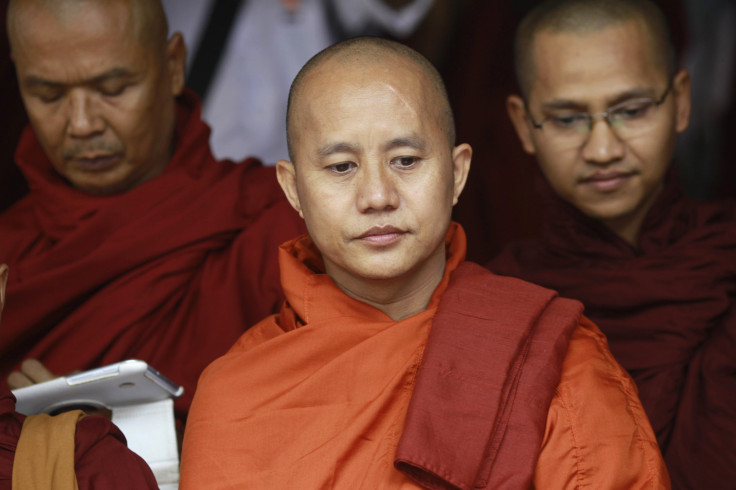Myanmar Telecom License Awarded To Ooredoo, A Company Based In Predominantly Muslim Qatar, And Many In Buddhist Nation Erupt

Just days after the government of Myanmar, a predominantly Buddhist nation transitioning from a closed military dictatorship to an economically open democracy, awarded a massive telecom contract to a company based in Qatar, citizens of the predominantly southeast Asian country erupted into a religiously oriented rage over the government's move.
The government awarded development licenses to Norway’s Telenor and Qatar’s Ooredoo, but on Friday prominent public figures and regular citizens were incensed that Ooredoo, which is abased in a Muslim country, should not get the contract.
The outcome of the controversy is being watched for signs that the nation's bid to join global civil society will succeed or fail.
Religious hatred between the Buddhist majority and Muslim minority in Myanmar has been ongoing and has recently come to the attention of the rest of the world, when Ashin Wirathu, the spiritual leader of the 969 movement, was featured on a Time magazine cover titled “The Face of Buddhist Terror."
The selection process for what will be the largest foreign investment to date in the newly open country of Myanmar, after decades of military rule, was already marred by its parliament’s attempt to block the announcement of the winners on Wednesday. The parliament wanted to delay the announcement until passage of a law that would have forced foreign companies to partner with domestic companies.
But the government chose to proceed and gave Telenor and Ooredoo licenses to begin developing the country’s mobile network in September.
Just hours after the announcement, a leader of the radical nationalist Buddhist 969 movement, Ashin Wimala, called for a boycott of Ooredoo, since it is based in Qatar, a Muslim country, the New York Times reports.
“Did the government have such little choice?” Wimala said in a telephone interview after the government announced the winners late Thursday. “Why did they award this to a Muslim company?”
Ooredoo, along with Telenor, beat out 90 other bids to secure the lucrative licenses. Less than 10 percent of Myanmar’s 60 million population has cell phones currently, and the two companies are expected to reach 75 percent of Myanmar’s population within five years. Ooredoo pledged a $15 billion investment, the largest among the bidding companies, to develop the Myanmar market.
The public also reacted quickly to the announcement and in many cases negatively.
On the Facebook page where the government announcement was posted, critical comments quickly accumulated. “Why? Why? Why Muslim company omg,” one person posted. “Say no to Ooredoo,” another commented.
If the rest of the 90 percent Buddhist citizens of Myanmar is likewise encouraged to turn against Ooredoo, the company’s future in the country could end before it begins.
The government has thus far stood by its choice of the two foreign firms. “We selected them for a license on the basis of their services: They have a good telecom service in Singapore,” U Ye Htut, a government spokesman, said by telephone, according to the New York Times.
The 969 movement in recent months has called for a boycott of shops owned by Muslims and products linked to Muslim-owned companies. The movement has also stated that the country’s Buddhist character is under threat and has proposed banning marriages between Muslims and Buddhists.
More than 200 Muslims were killed last year by Buddhist lynch mobs, and more than 150,000 people, mostly Muslims, have been displaced, according to the New York Times.
The telecom licenses bid was closely monitored by investors around the world, as Myanmar has emerged as an unconquered and rapidly developing market as of late.
Both Telenor and Ooredoo will build the Myanmar telecom network from the ground up. Previously, the country’s two military-owned telecom companies kept the price of mobile phones steep and inaccessible to the majority of its citizens.
Despite such turbulence, Ooredoo has expressed enthusiasm for its business in Myanmar.
“We’re very excited about winning a licence in Myanmar, and we look forward to working in partnership with the government of Myanmar to develop a world-class next-generation network,” His Excellency Sheikh Abdullah Bin Mohammed Bin Saud Al-Thani, the chairman of Ooredoo, said. “Ooredoo will bring all of its experience of developing and delivering networks in the Asean region to Myanmar.”
The company already has telecom operations in Singapore, Laos and the Philippines in Southeast Asia.
© Copyright IBTimes 2024. All rights reserved.



















